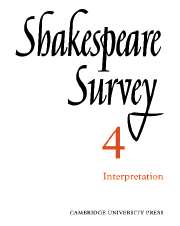Book contents
- Frontmatter
- Fifty Years of Shakespearian Criticism: 1900–1950
- Motivation in Shakespeare’s Choice of Materials
- The Sources of Macbeth
- Shakespeare and the ‘Ordinary’ Word
- Malone and the Upstart Crow
- An Early Copy of Shakespeare's Will
- The Shakespeare Collection in the Bodleian Library, Oxford
- Was there a ‘Tarras’ in Shakespeare’s Globe?
- Tradition, Style and the Theatre To-day
- Shakespeare in Slovakia
- Shakespeare in Post-War Yugoslavia
- International Notes
- Shakespeare’s Comedies and the Modern Stage
- The Year's Contributions to Shakespearian Study 1 Critical Studies
- 2 Shakespeare’s Life, Times and Stage
- 3 Textual Studies
- Book Received
- Index
- Plate Section
Motivation in Shakespeare’s Choice of Materials
Published online by Cambridge University Press: 28 March 2007
- Frontmatter
- Fifty Years of Shakespearian Criticism: 1900–1950
- Motivation in Shakespeare’s Choice of Materials
- The Sources of Macbeth
- Shakespeare and the ‘Ordinary’ Word
- Malone and the Upstart Crow
- An Early Copy of Shakespeare's Will
- The Shakespeare Collection in the Bodleian Library, Oxford
- Was there a ‘Tarras’ in Shakespeare’s Globe?
- Tradition, Style and the Theatre To-day
- Shakespeare in Slovakia
- Shakespeare in Post-War Yugoslavia
- International Notes
- Shakespeare’s Comedies and the Modern Stage
- The Year's Contributions to Shakespearian Study 1 Critical Studies
- 2 Shakespeare’s Life, Times and Stage
- 3 Textual Studies
- Book Received
- Index
- Plate Section
Summary
The field of study which I propose for consideration has to do with Shakespeare’s plots in two aspects, the general and the detailed. When he utters the familiar lines in A Midsummer Night’s Dream,
And as imagination bodies forth
The forms of things unknown, the poet’s pen
Turns them to shapes and gives to airy nothing
A local habitation and a name,
he gives a perfect description of the most fundamental operation of the human mind. As the possessor of one of the greatest minds on record, he is at the same time describing his own transcendent skill.
There is usually to be discovered in Shakespeare's plays a form or pattern, sometimes easily identified, sometimes not; sometimes apparently consciously developed, sometimes seemingly almost accidental. These are "the forms of things unknown". The power of determining forms, that is, of regarding as irrelevant all attending circumstances except a certain conceptual form that controls the complex of events, is the most characteristic mental trait of mankind, and in the recognition of significant form in any configuration presented to experience Shakespeare excelled.
- Type
- Chapter
- Information
- Shakespeare Survey , pp. 26 - 34Publisher: Cambridge University PressPrint publication year: 1951
- 2
- Cited by

